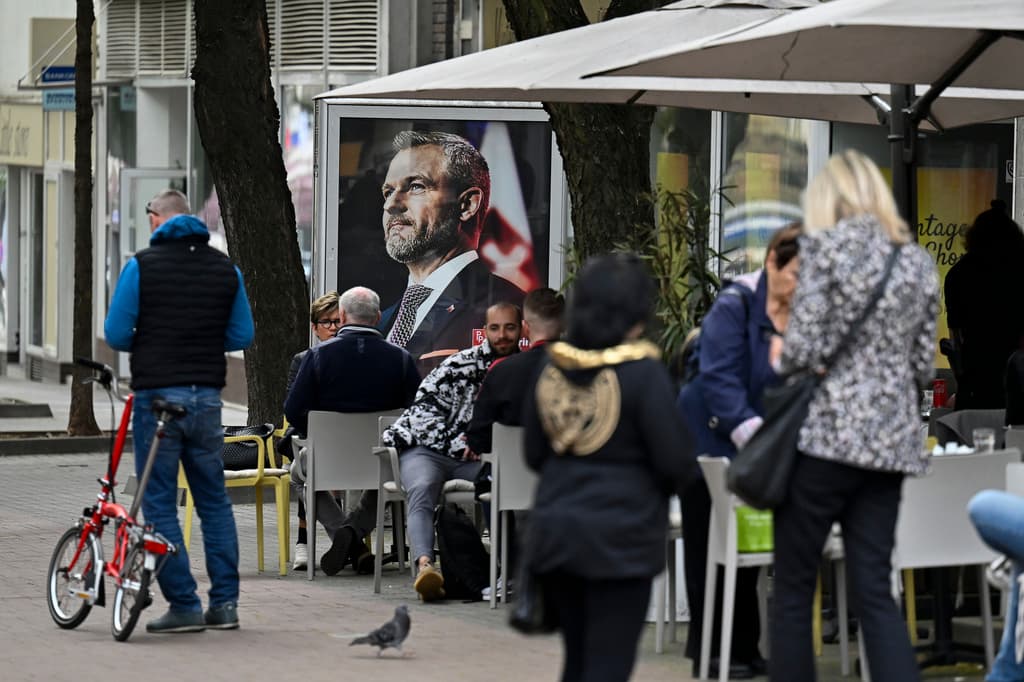Emergence of a New Slovak Leader Gives Putin Another Win in Eastern Europe
It’s all difficult to fathom, given that both Hungary and Slovakia fought hard to get into the EU and NATO and away from their former Soviet handlers.

Even with Russia waging war right on their doorsteps, two European Union countries now have pro-Putin governments. The view from here on the continent is that the contagion could spread.
Hungary was first to go when it put Viktor Orban in power 14 years ago. Earlier this month, Slovakia, which was once part of Czechoslovakia, solidified its populist, pro-Putin stance when it elected Peter Pellegrini as president. Slovakia already has a prime minister dovish on Moscow, so now Bratislava is solidly sympathetic to the Kremlin.
This is all difficult to fathom, given both countries fought hard to get into the EU and NATO. And given that Soviet tanks rolled across the borders of both Hungary and Czechoslovakia when they chafed at Communist rule in just the last century. Vladimir Putin must be pleased to see old vassals coming back for more.
To an extent, Mr. Putin earned it. It is believed that Russia spent more money on disseminating fake news and information in Slovakia than in any other eastern European EU country. With European Union elections coming up soon, one can imagine Kremlin trolls furiously downing espressos as they get ready for a buzzy spring. They are only just getting started.
President-elect Pellegrini’s opponent in the recent elections was called an American lackey. Stories circulated that he would bring back the draft and send Slovak boys to fight in Ukraine. All of this was untrue.
Finally, many Slovaks assume that what their leaders most want to emulate about Russia is its oligarchic system where corruption goes unpunished and gangsters sit close to the power centers. Prime Minister Robert Fico has done away with the Special Prosecutor’s office set up to investigate corruption. He has been accused of doing this to keep his cronies out of jail.
None of this changes the fact that this pro-Putin tag team of Hungary and Slovakia is undermining NATO’s consensus on Ukraine. One of Mr. Fico’s most famous campaign pledges was not to send “another bullet” to Kyiv.
Mr. Pellegrini, moreover, has said that he would oppose sending Slovak troops to defend another NATO country if it was attacked. This would violate the alliance’s Article Five, which holds that an attack on one member is an attack on all.
Just the other day, Mr. Orban stirred things up further by warning that the West is “one step away” from sending troops to Ukraine. He accused Brussels of having “a pro-war majority” when Ukraine’s backers would argue that their posture is not about war at all but rather about the future security of Europe.
At this point Bulgaria, too, is seen as vulnerable to populist and pro-Russian headwinds. Prime Minister Nikolai Denkov stepped down this month amid political infighting. His administration had resisted Russia, expelling dozens of spies who had posed as diplomats and weaning the country off Russian energy.
Mr. Denkov said he thought Bulgaria’s joining the EU and NATO was the most positive event in Bulgaria’s recent history, but now he fully expects Russian disinformation to start flooding the country in an attempt to influence Bulgaria’s upcoming elections.
Meanwhile, the outgoing pro-Europe Slovak president, Zuzana Caputova, is making a whirlwind farewell tour across the continent, taking this last chance to shore up ties she worked hard to cultivate during her term.
Ms. Caputova had reinforced a pledge to the NATO secretary general to keep defense investments at at least two percent of GDP. She stated on Instagram that “adhering to NATO commitments is our common goal because anything else would be a risk to our own safety.”
Some Slovaks are displeased with their country’s reluctance to send more ammunition to Ukraine — and are putting their money where their mouth is. They have raised more than $2 million in the course of the last week for an initiative led by the Czech government to buy artillery shells for Kyiv.
A 99-year-old World War II veteran of the Slovak uprising against the Nazis, Otto Simko, lent his name and his energy to the spectacular crowdfunding effort, telling the BBC, “I can tell you there was no point negotiating with Hitler and there is no point negotiating with Putin.”

